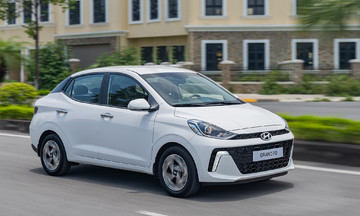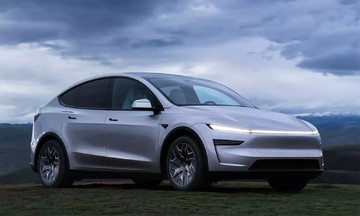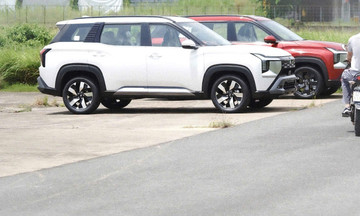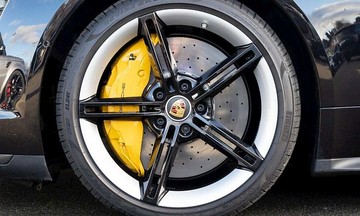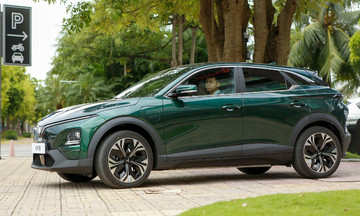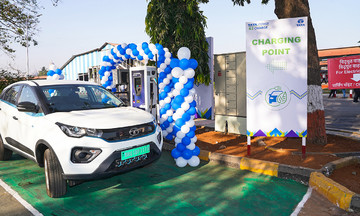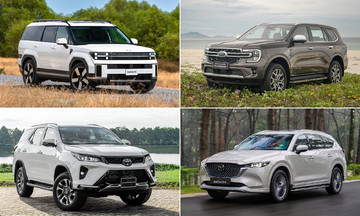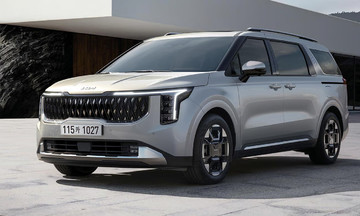A crash test video featuring the Li i8 sedan and a truck colliding at approximately 60 mph was the highlight of the car's launch event. The footage, showing the truck's wheels lifting off the ground and significant damage to the cab and cargo area, raised concerns about the truck's safety.
According to Li Auto, the i8's A, B, and C pillars, along with the door beams, remained intact after the impact. All 9 airbags deployed correctly, and the battery showed no signs of leakage or explosion. Furthermore, the doors automatically unlocked, and the handles popped out.
CEO Li Xiang emphasized the truck's weight, stating, "I confirmed with my colleagues that the truck weighed 8 tons and was unloaded," highlighting the i8's supposedly superior passive safety features.
The truck involved was identified as a Dongfeng Liuzhou model, part of the Dongfeng Motor Corporation.
Following the launch, the crash test video gained significant attention on social media, generating mixed reactions. Some users criticized the test, while others defended it. The truck manufacturer responded, suggesting the situation was misleading and that "intelligent people can see through the deception".
In a surprising move, Li Auto subsequently blurred the logo on the truck's steering wheel in the video.
By 31/7, all parties involved had issued statements, revealing significant disagreements. The truck manufacturer accused Li Auto of violations, claiming the video was released without permission and that the test conditions did not accurately reflect real-world scenarios. They argued this undermined fair competition and raised concerns about consumer manipulation.
Conversely, Li Auto defended the crash test as a legitimate simulation of real-world traffic collisions conducted by a reputable independent testing entity, the China Automotive Engineering Research Institute (CAERI). The company asserted that CAERI provided the testing environment and equipment, free from any influence by Li Auto.
CAERI confirmed that the entire process adhered to regulations and standards, denying any adjustments based on client preferences. They stated the test truck was brand new, though further details about its origin require confirmation.
With each side holding firm, many believe Dongfeng Liuzhou suffered the most damage from this incident. A representative quoted by QQ News expressed concern that the video suggested the truck's suspension had been altered, leading to exaggerated test results.
According to CarNewsChina, the recent controversy surrounding Li Auto highlights the issue of "over-marketing" among Chinese automakers. This issue previously surfaced in the autonomous driving sector, resulting in a nationwide ban in the field following a fatal accident involving Xiaomi's SU7 in late 3/2025.
Typically, in accidents involving heavy trucks and smaller passenger cars, the car sustains more damage. With the Li i8 weighing 2.6 tons and the truck 8 tons, many find it difficult to believe the i8 could lift the truck's wheels off the ground.
This incident poses significant challenges for Li Auto, as some consumers, including current owners, express deep skepticism about the company's product, suspecting fabricated details surrounding the event. The situation even became a meme on Chinese social media, with users comparing the i8 to nuclear weapons or other destructive devices.
Li Auto, a startup founded in 2015 and headquartered in Beijing, has faced scrutiny regarding its profitability. In 7/2024, Song Zhiping, chairman of the China Association of Public Companies (CAPCO), stated at an event that only two automakers profited from new energy vehicles: BYD and Li Auto.
In 2023, Li Auto's total revenue was 17 billion USD, a 173.5% increase compared to 2022. Of this, the company had a net profit of 1.6 billion USD with a profit margin of approximately 9.5%. Currently, the company offers 8 models in China: two fully electric vehicles (including the i8) and six extended-range electric vehicles (EREVs).
My Anh



